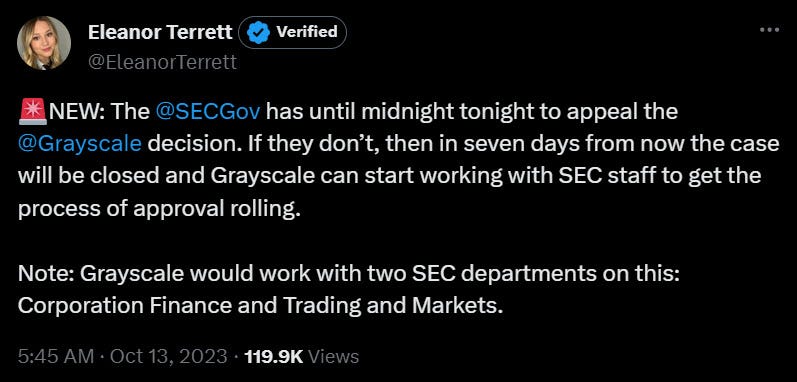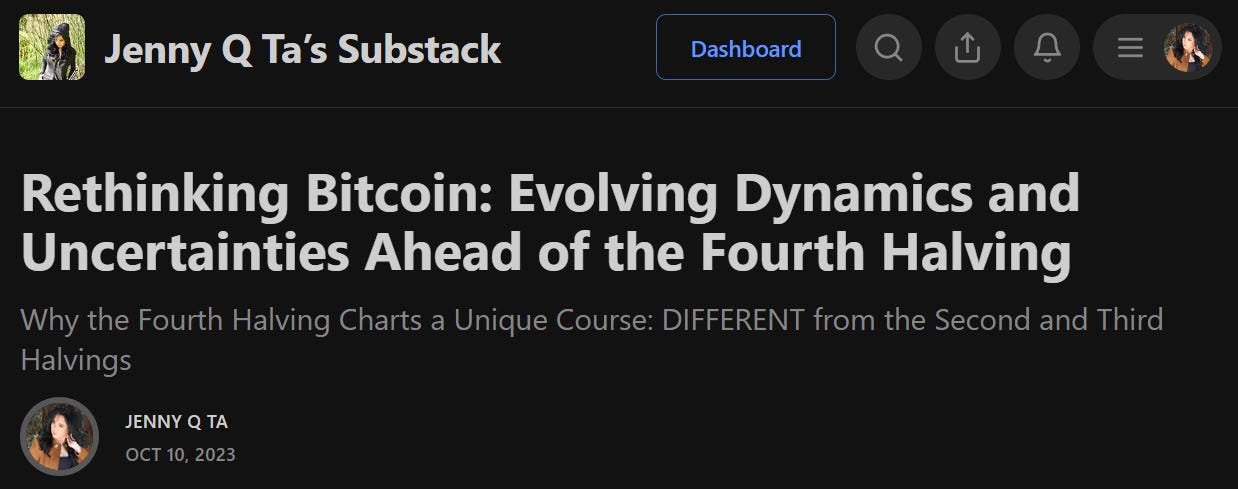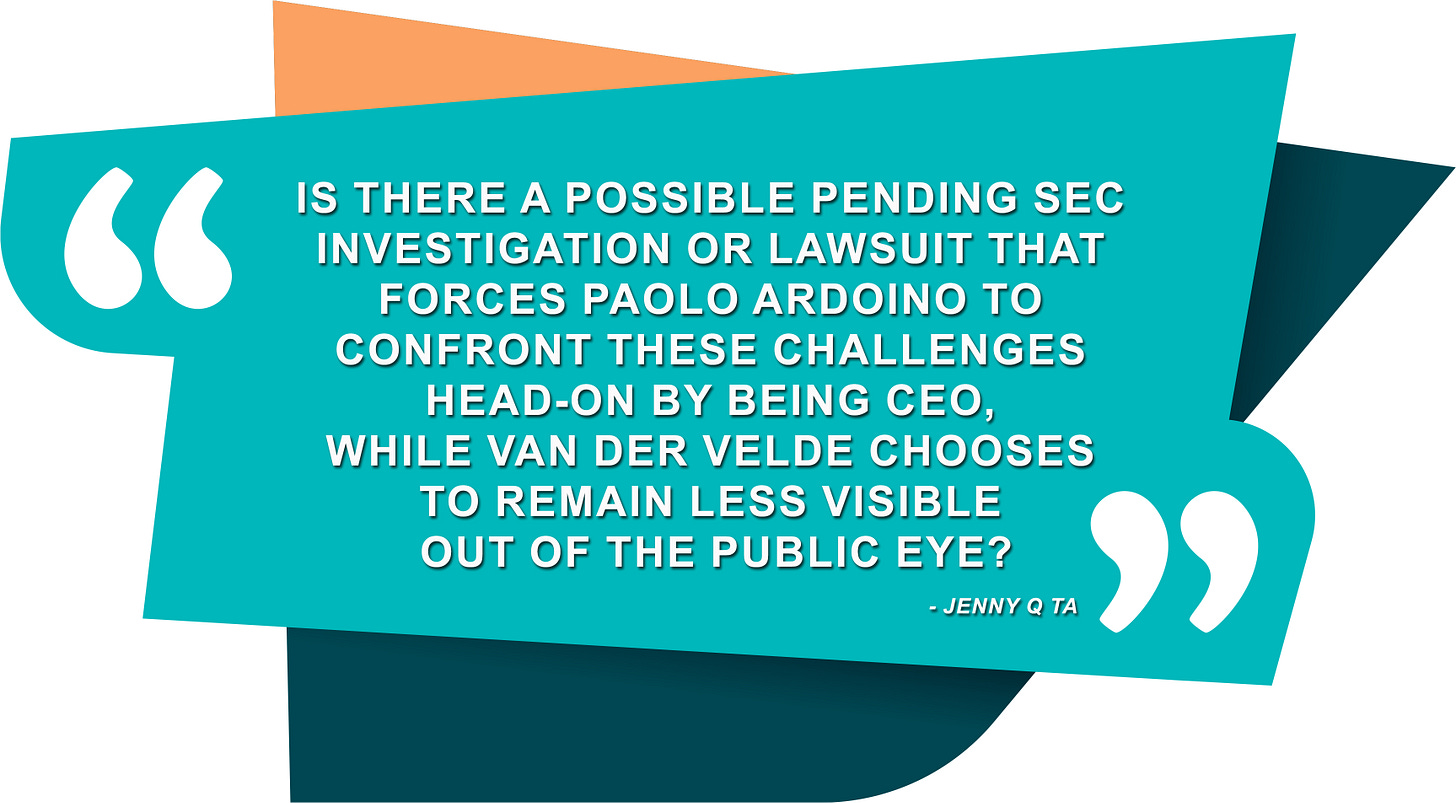Crypto Unleashed: SEC's Grayscale Spot Bitcoin ETF Call and Tether's Paolo Ardoino's CEO Shift Amid Legal Turbulence
Navigating Regulatory Storms and Legal Leadership Transitions in the Crypto Realm
This morning, Fox reporter Eleanor Terrett reported that the SEC has until midnight tonight to decide on appealing Grayscale's case. If they don't appeal, Grayscale can start the approval process for a Bitcoin spot ETF in seven days. Let's explore the SEC's approach to Grayscale's application and its strategic implications.
I believe the SEC will not appeal by today's deadline. Their decision aligns with their strategic approach to Grayscale's spot Bitcoin ETF application. Not appealing allows the SEC to retain control over the regulatory process, work directly with Grayscale to address concerns, and potentially deny the application if it falls short of their regulatory standards.
This choice reflects the SEC's cautious stance on spot Bitcoin ETFs, rooted in past concerns about investor protection, market manipulation, and regulatory issues. It allows the SEC to assert their regulatory authority and maintain meticulous scrutiny.
An appeal may not be the linchpin determining the fate of Grayscale's application. Even if the SEC were to appeal, it doesn't guarantee a change in the application's status. Appeals are intricate and time-consuming, with unpredictable outcomes.
In my recent article titled "Rethinking Bitcoin: Evolving Dynamics and Uncertainties Ahead of the Fourth Halving," I shared a video featuring economist Martin Armstrong discussing Bitcoin's potential role in government surveillance. The evolving cryptocurrency landscape and the Fourth Halving's dynamics raise uncertainties. I believe the approval of a spot Bitcoin ETF is UNLIKELY due to concerns about the absence of a sufficiently regulated crypto market and the fact that Bitcoin is not traded on regulated exchanges.
In summary, I believe the SEC's decision not to appeal is a calculated part of their approach to maintain control, address concerns, and potentially deny the application if it doesn't meet their stringent standards. The appeal process is just one facet of the broader regulatory landscape they navigate.
Why Paolo Ardoino's CEO Ascent Mirrors CZ of Binance and SBF of FTX: Navigating the Abyss Amid Cryptocurrency Industry Legal Turmoil

According to CNBC this morning, “Stablecoin Tether promotes tech chief to CEO, taking over from mysterious crypto leader.” Amid ongoing investigations and regulatory scrutiny, Paolo Ardoino is set to become the CEO of Tether, while the current CEO, Jean-Louis van der Velde, transitions to an advisory role. This leadership change is significant, given the legal risks associated with the cryptocurrency industry.
The situations of Paolo Ardoino at Tether, Changpeng Zhao (CZ) at Binance, and Sam Bankman-Fried (SBF) at FTX draw some striking similarities, each reflecting the complex and precarious nature of the cryptocurrency industry.
Paolo Ardoino's appointment as the new CEO of Tether occurs in the midst of ongoing investigations and regulatory scrutiny, much like CZ and SBF have faced in their roles. All three executives are navigating a landscape filled with legal pitfalls, and the stakes are exceptionally high.
CZ of Binance has been at the center of potential indictments for financial crimes and fraud. This legal risk, as in the case of SBF, highlights the inherent dangers of leading cryptocurrency companies. SBF's bail was recently revoked, and he faces the possibility of spending the rest of his life in jail for orchestrating one of the largest financial frauds in history.
The common thread in all three cases is that they are dealing with far-reaching consequences while attempting to navigate the intricacies of the regulatory environment. Paolo Ardoino's transition to CEO of Tether is a stark reminder of the high stakes and legal uncertainties that cryptocurrency executives, like CZ and SBF, must confront. As they continue to face potential legal repercussions, the future of these companies and the liabilities their leadership may incur will be significantly influenced by the outcomes of ongoing investigations.
The case of Binance CEO Changpeng Zhao (CZ) and others facing potential indictments for financial crimes and fraud underscores the legal risks associated with cryptocurrency leadership. In response to this regulatory environment, Jean-Louis van der Velde may have WISELY stepped down as CEO to reduce his legal exposure, although that may not release him from any liabilities up through this point.
Tether's CEO, Paolo Ardoino, shoulders immense responsibilities and liabilities inherent in the CEO role. As a CEO, he holds the ultimate decision-making authority, acts as the public face of the company, and is accountable for strategic choices and the organization's image. Additionally, CEOs like Paolo must navigate complex regulatory landscapes, ensuring compliance with various laws and regulations. They have a fiduciary duty to act in the company's best interests, both financially and ethically. This responsibility is particularly critical in preventing potential fraud and scams, as CEOs like Paolo must guarantee transparent practices to avoid legal actions. Furthermore, they oversee subordinates and may be held accountable for their actions, while also facing scrutiny from shareholders and stakeholders. Any neglect in meeting these responsibilities could result in severe legal consequences for CEOs.
While Paolo Ardoino's transition to CEO demonstrates his willingness to tackle potential legal and regulatory challenges, it raises questions – is there a possible pending SEC investigation or lawsuit that forces Ardoino to confront these challenges head-on by being CEO, while Van der Velde chooses to remain less visible out of the public eye? Both have maintained such roles since 2014. This transition does raise intriguing questions.
In summary, Paolo Ardoino's transition to the CEO role at Tether, in parallel with cases like CZ at Binance and SBF at FTX, highlights the intricate legal challenges that cryptocurrency executives confront. These figures at the forefront of the industry assume the highest risk, especially in Tether's case, where Paolo has effectively been performing the role since his involvement with Bitfinex in 2014 and his appointment as Tether's CTO in 2017. As these investigations for CZ of Binance and SBF of FTX unfold, as we ponder Tether's future, they will profoundly influence the future of these companies and the legal responsibilities undertaken by their executives.








It's never good when the CEO quits
Great article and well put, Jenny!
In a scenario where a company has only the CEO and the Chief Technology Officer (CTO) as that of Tether, and an investigation by regulatory agencies like the SEC or DOJ is underway, the preference would typically be to talk to both the CEO and the CTO. Both individuals are likely to possess critical information about the company's operations and activities that are relevant to the investigation.
I would like to hear your take on why you believe they're doing this swap after Paolo has been publicly speaking like he's been the CEO since 2017. I mean, why now?